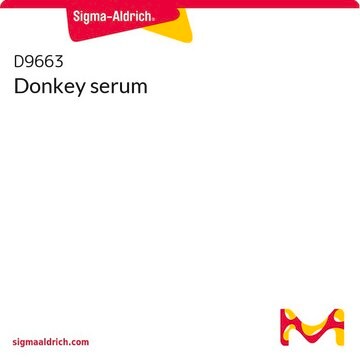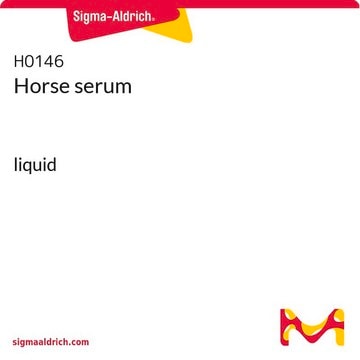AB153-I
Anti-Fluorescent Gold Antibody
from rabbit
Synonym(s):
Fluorescent Marker
Sign Into View Organizational & Contract Pricing
All Photos(2)
About This Item
UNSPSC Code:
12352203
eCl@ss:
32160702
NACRES:
NA.41
Recommended Products
biological source
rabbit
Quality Level
antibody form
purified antibody
antibody product type
primary antibodies
clone
polyclonal
species reactivity (predicted by homology)
all
technique(s)
immunohistochemistry: suitable (paraffin)
shipped in
wet ice
target post-translational modification
unmodified
General description
Fluorescent Gold (hydroxystilbamidine), better known as Fluorogold, has been a very popular fluorescent marker used to retrogradely label projection neurons. AB153 also reacts with aminostilbamidine quite nicely in frozen, 4% PFA fixed tissues.
Specificity
This antibody will react with any species sample treated with Fluorescent Gold.
Immunogen
KLH-conjugated Fluorescent Gold.
Application
Anti-Fluorescent Gold Antibody is a highly specific rabbit polyclonal antibody, that targets Fluoro-Gold & has been tested in IHC (Paraffin).
Immunohistochemistry Analysis: A representative lot from an independent laboratory detected Fluorescent Gold treated neurons in rat frontal cortex tissues (Chang, H. T., et al. (1990). J Neurosci Methods. 35(1):31-37.).
Quality
Evaluated by Immunohistochemistry in fixed frozen Fluorescent Gold treated rat cerebral cortex tissues.
Immunohistochemistry Analysis: A 1:10,000 dilution of this antibody detected Fluorescent Gold in fixed frozen Fluorescent Gold treated rat cerebral cortex tissues.
Immunohistochemistry Analysis: A 1:10,000 dilution of this antibody detected Fluorescent Gold in fixed frozen Fluorescent Gold treated rat cerebral cortex tissues.
Physical form
Format: Purified
Not finding the right product?
Try our Product Selector Tool.
Storage Class Code
12 - Non Combustible Liquids
WGK
WGK 1
Flash Point(F)
Not applicable
Flash Point(C)
Not applicable
Certificates of Analysis (COA)
Search for Certificates of Analysis (COA) by entering the products Lot/Batch Number. Lot and Batch Numbers can be found on a product’s label following the words ‘Lot’ or ‘Batch’.
Already Own This Product?
Find documentation for the products that you have recently purchased in the Document Library.
Anett J Nagy et al.
PLoS biology, 16(6), e2004712-e2004712 (2018-06-26)
Evolutionary development of vision has provided us with the capacity to detect moving objects. Concordant shifts of visual features suggest movements of the observer, whereas discordant changes are more likely to be indicating independently moving objects, such as predators or
Chang-Hui Chen et al.
Frontiers in neural circuits, 14, 605332-605332 (2020-12-17)
Area prostriata in primates has recently been found to play important roles in rapid detection and processing of peripheral visual, especially fast-moving visual information. The prostriata in rodents was not discovered until recently and its connectivity is largely unknown. As
Charles Raver et al.
The Journal of neuroscience : the official journal of the Society for Neuroscience, 40(17), 3424-3442 (2020-03-29)
The parabrachial (PB) complex mediates both ascending nociceptive signaling and descending pain modulatory information in the affective/emotional pain pathway. We have recently reported that chronic pain is associated with amplified activity of PB neurons in a rat model of neuropathic
Patrick Lüningschrör et al.
Cell reports, 30(10), 3506-3519 (2020-03-12)
Genetic variations in TMEM106B, coding for a lysosomal membrane protein, affect frontotemporal lobar degeneration (FTLD) in GRN- (coding for progranulin) and C9orf72-expansion carriers and might play a role in aging. To determine the physiological function of TMEM106B, we generated TMEM106B-deficient
Alexander A Nevue et al.
Frontiers in neuroanatomy, 9, 168-168 (2016-02-03)
The response of sensory neurons to stimuli can be modulated by a variety of factors including attention, emotion, behavioral context, and disorders involving neuromodulatory systems. For example, patients with Parkinson's disease (PD) have disordered speech processing, suggesting that dopamine alters
Our team of scientists has experience in all areas of research including Life Science, Material Science, Chemical Synthesis, Chromatography, Analytical and many others.
Contact Technical Service








